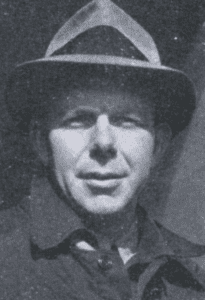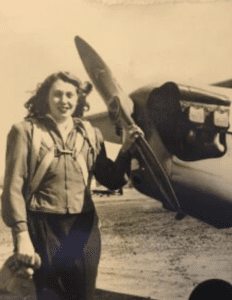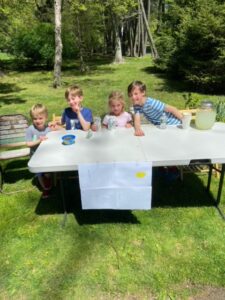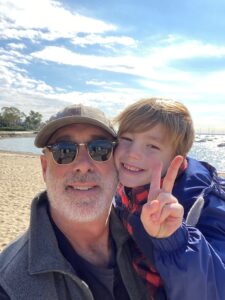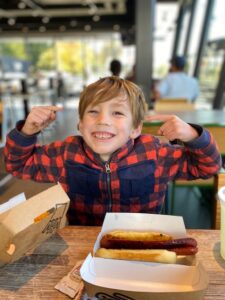Author’s note: As I write the Good Grandpa book, slated for publication in 2025 by Regalo Press, I’m sharing parts of the chapters on my blog. This post tells the story of Forever Letters and the power to share our love and wisdom with future generations.
In the early 12th century, Judah ben Saul ibn Tibbon, a translator and physician living in Southern France, picked up his pen to write a letter. He was likely an old man at the time, wise and perhaps frail, fully aware of the limited amount of sand remaining in his life’s hourglass. His words were not meant to be read by friends or business associates. It was a letter to be read in the future by his children and grandchildren:
“Avoid bad society, make thy books thy companions, let thy bookcases and shelves be thy gardens and pleasure-grounds. Pluck the fruit that grows therein, gather the roses, the spices, and the myrrh. If thy soul be satiate and weary, change from garden to garden, from furrow to furrow, from sight to sight. Then will thy desire renew itself, and thy soul be satisfied with delight.”
Judah’s letter was a form of ethical will, an ancient Jewish tradition with roots in the Bible. The practice of passing on accrued wisdom to nurture future generations, these written time-capsules, became more broadly used through the Middle Ages and in time was adopted by people of all faiths, continuing into our modern era.
Here, I must pause to ask my father’s favorite question: Why?
I’ve seen the answer written on the faces of the many grandpas I’ve recently interviewed. Not one single man I’ve spoken with (all of them Boomers like me), ever had a chance to know one of their grandpas. The actuarial tables show why this is the case. An American man born in 1900 had an average life expectancy of about 47 years.12 By the time their children had children most of them were no longer on the scene. An ethical will, often referred to as a Forever Letter, is an insurance policy against the loss of the precious ideas and values we pray our grandchildren will learn from us. We yearn for the chance to guide our grandchildren and leave a lasting legacy.
The history of the Forever Letter was brought home to me by a grandpa who has become a friend, Bob Halperin.
Bob reached out to me after reading my blog, and we met up at the local Grandpa Networking Center (Starbucks), and for subsequent fast hikes through ice-covered nature trails. Bob, I quickly learned, is a fascinating guy. He earned his undergraduate degree in economics from Brandeis, an MBA from Harvard Business School, and went on to lead a range of learning-focused organizations, notably serving as Director of the MIT Sloan Executive Education program. Today, Bob runs his own consulting practice that provides support groups for senior executives.
Bob and I have different educational backgrounds (his is better), but have the same haircut (bald), and share an interest in family stories. Bob, 68, speaks animatedly to convey ideas that spark out of his prodigious mind like intellectual popcorn. He’s also a writer, and a good one. While he didn’t know his grandfathers, one of them — Morris Jacobsohn—nevertheless left a big impression on him. “In 1950,” Bob said, “he wrote a letter to my oldest cousin, David, and I got to read it when I was 12.” Bob shared the letter with me. It begins…
I am addressing this letter to you. Being the oldest, the first of our grandchildren, you will reach maturity and fuller understanding before all your cousins. My request: please impart the contents of this letter to them, as they reach the age of full understanding.
Morris went on to describe his early childhood growing up impoverished in Palestine before it was Israel, his learning Hebrew at the age of three and a half, and studying the Talmud at age six. Morris poured his soul into sharing a structure for how his grandchildren could and should live:
In this outline, I hope to impart to you my personal code for living. I consider this code, not merely my ethical foundation, but the very cause of my humble attainments in life.
His lifelong love of scripture featured prominently in the formation of his personal code…
Studying the Bible in the original Hebrew I was trained to reach a broader understanding of “How and Why” of human actions and progress.
Morris finishes with words that spoke to Bob as if he were in the same room with him, because, in a way, he was:
One wishes to be remembered well. And in the hope that you will all so remember me, I conclude this letter with my final wishes; may you all share good opportunities and good fortune all through your lives.
Inspired by his grandfather’s example, Bob started writing letters to his two daughters when they were young, each letter designed to share his love and wisdom to mark a milestone in their lives such as graduating from high school or having their first child. When Bob’s first grandchild was born, he set up a special Gmail address from grandpa Bob. As of today, he’s written about forty letters to his three grandchildren, letters from Saba (Hebrew for grandfather). “They’re written in an adult way for them to read when they’re older,” Bob said, “and I’ve told my daughters ‘here’s the email address, here’s the password. I could die at any time, but they’re there.’”
Bob shared some of the letters with me, starting with this introduction…
This is the first of what I hope will be many emails I will send to you over the coming months and years! It may be many years before you can fully understand all of my messages. I will leave it to your parents to decide how and when to share with you.
And an email with a playful lesson on gratitude…
One small way that I try to remember to be grateful for even the smallest things I have is by saying what orthodox Jews call Asher Yatzar (or informally the “Peeing Prayer”).
Plus other emails addressing some of life’s most profound challenges….
The reality of life is that you will be blessed to have people in your life that you love and respect, and can’t imagine living without. And then through accident or illness, they will be taken away from you. I cannot shield you from these hard realities, but I can offer some perspective, having lived through my own losses.
I found Bob’s letters to be incredibly charming, thoughtful, loving and smart. How cool is it that a tradition that dates back to Biblical times is now in email form? While Saba’s letters were written to his grandchildren, they also spoke to me. The more I thought about Letters from Saba, the more I thought of my own family and our legacy.
I remembered a letter that my dad had written to my four older brothers a few years before I was born.
The first time I read it I was in my early twenties, when my dad was still with us, and I recall thinking it was lovely, but not life-altering. After talking with Bob I tracked down the letter and when I read it again—as a 64 year old grandpa—it resonated profoundly. My dad passed away in 2011 and reading this brought him back to me, vividly. But I also had to live longer to more fully appreciate the depth and beauty of his wisdom. Here is the letter.
July 2, 1956
To my Children:
When you get old enough to understand this letter fully, you will be as old as I am but I hope you will keep it, Calvin, so that you and the others may read it later on. Dear Calvin, Charles, Bill Jr. and John: There are times when I wished I knew what my father thought. It wasn’t that I wanted to lean on him for advice but it’s just that I always felt that he was a man that I would have liked to have known better. I expect to be around a long time after you have grown up but I want to talk to you now.
I’ve just finished flying across the country — to San Francisco and then to Los Angeles and Denver where I bought your mother an Aspenwood pin and some gold nuggets for you fellas — and then back to Boston. I know that you will all take this air trip some day and when you do, I know you will feel as I did that it is a tremendous and fascinating experience — where the grandeur of these United States perceived in a brief span of hours brings the meaning of unity home — unity of the land and the people and the weather and the soil. Nature shouts out to you, “This is what I am.” And our people say, “Fine, this is what you are. Here is what I can do to change you — to make you do something for me and my fellow Americans. Nature, I have the most powerful tool in the world – it’s the cooperation I get from my fellow citizens. They are my partners and if your soil grows plants and your mountains give minerals and if your waters carry boats and generate power and quench people’s thirst, it is because they are partners.”
I looked down, near sunset, on the tiny town of Delta surrounded by the vast desert of Utah. Off on the edge of town on a hill was a Mormon church. The people of the town had planted the hill with green grass and connected up lights on the lawn to illuminate the outside of the church. And with the sands of the desert mixing with the grass at the bottom of the hill, one of the greatest symbols of man’s unity shown brightly and gloriously in the dusk.
One of the things that will impress you when you fly across the country is the progress that people have made and the potential for the progress that has yet to come. You are all going to take part in that progress and your contributions to that progress will influence the lives of each of your other fellow Americans. Here is the challenge that comes with being born a United States citizen. You have more tools at your disposal here than anywhere in the world, — more knowledge, more education, more cooperating and effective people to work with, and a more responsive and better loved governmental system than the citizens of any other country in the world.
The challenge to each of you is all the greater because you have these things with which to work. What are some of the things that challenge you Calvin and you Charles and you Bill and you John. When you read this letter later on, you will be able to state them as well as I.
1. The successful completion of a world community where the same cooperative spirit that exists across the United States exists throughout the world.
2. The elimination of disease.
3. The pushing back of boundaries of scientific knowledge, both in the physical and the social fields, and the application of that knowledge for the good of everybody who breathes oxygen and those yet to breathe it (your children).
You will come to know that the greatest contribution that each of you shall make to this progress shall come by using your minds — by thinking. The greatest contributions to human welfare are not made by those who serve the people, but by those who determine how to serve. One of the most important contributors to the progress of the United States had this to say, “The man who doesn’t make up his mind to cultivate the habit of thinking misses the greatest pleasure in life. He not only misses the greatest pleasure but he cannot make the most of himself. All progress, all success, springs from thinking.” That was Thomas Edison.
When you grow older, read. Read Edison’s biography, his own notes, Ernest Dimnet’s “The Art of Thinking,” Osborn’s “Applied Imagination,” Leonardo DaVinci’s “Notebooks,” Newton’s “Principia,” Abraham Lincoln’s letters, Bertrand Russell’s “A History of Western Philosophy.” Read what you love to read. Great men will speak to you. You can get their thoughts for the price of a book.
Calvin and Charles and Bill and John, feel deeply the value and the purpose of the thing you are striving to create. Question, question, question! What is it good for? Who will benefit? How? When? Where? Why?
Each of you will come to feel that you have a great task before you. Be a fighter. Choose your weapons carefully and fight. Find more pleasure in intelligent dissent than in passive agreement, for, if you value intelligence as you should, the former implies a deeper agreement than the latter. And remember, that the most powerful weapon in the world is clear thought.
With all my love to you boys,
Dad
What immediately struck me after reading this was my dad’s heartfelt portrayal of America. I could barely recognize his positive 1956 vision of our country versus the toxic divisive mess we live in today. How and why has America come to this juncture, and what can we do about it? How can our grandkids have any hope of becoming the next great generation if our country lacks a hopeful unifying vision for the future?
It wasn’t until Bob shared with me his #1 wisdom that an answer, a sliver of light, began to gleam in my darkness.
Bob smiled and said, “Rabbi Hillel was asked to summarize the Torah standing on one foot and what he says is some version of the Golden Rule: Do unto others as you would have them do onto you; the rest is commentary. Now, go study! So, my first answer to your question is, try to be a good listener. Because if you can be a good listener, the rest is commentary, right? If you can be a good listener, everything else is possible.”
When I read my dad’s letter—and the letters from Bob’s Saba—with this in mind, it bought home to me that conveying wisdom in our ethical wills is only the beginning. What matters is actually listening to the amazing things that are written, and then taking action. I had read my dad’s guidance to think and read, I had seen the list of books he told us to read, but I’d never read them.
Last week I went to the library and took out Bertrand Russell’s History of Western Philosophy and Leonardo DaVinici’s Notebooks and I’m devouring them like a man who’s been starving in the wilderness.
I’m listening to Bob’s Saba’s advice, too, and will finally read the Bible (the whole thing versus the bits I read in Sunday School). And I’m saying the Peeing Prayer on a regular basis!
I’ve started conversations with my children about what it means to be American, and we are planning a family trip with all the grandkids to visit the Statue of Liberty. I want them to know that America can still be a beacon of hope to the world — if we get our act together. I’ll tell them that I have traveled to many countries, and they are great countries, but to this day I would still choose to live in the U.S., despite its many flaws, because we are the only country that has a dream — the American dream. Anything is possible here. Anything. But to Bob’s point, the full range of what’s possible depends on our ability to listen to each other.
We may not agree with the political views of others, but that doesn’t make them bad people.
We can find pleasure—and ultimately common ground—through thoughtful conversations and intelligent dissent, versus bloodthirsty cage matches on Facebook and cable news. In his letter to his grandsons Saba Morris wrote it better than I can: “Broad-mindedness, as against being fanatic or addicted to habits and ideas, leads on to the correct fashioning of one’s own life. Tolerance and patience, as added virtues, help to prevent much of bitterness and suffering, from disappointments and frictions with society and surroundings.”
The writing of letters meant to be read by future generations has one additional and critically important value. Simply writing down our thoughts helps to crystalize them today. For me, this entire book is a letter to my grandchildren, all the richer thanks to the wonderful ideas other Sabas have shared with me. If indeed the most powerful weapon in the world is clear thought, I hope the collective wisdom here will prove in time to be an arsenal that unleashes extraordinary potential. Question, question, question! If the answers don’t come to us right away, we’ll keep trying and never give up. We’ll fight like hell, because this dream is worth it.

Bob Halperin hiking in New Hampshire with his growing family. July 2022.
Author’s note: I’m grateful to Bob Halperin for reaching out to me and sharing his story. If you’re a grandpa who’s writing letters to your grandkids, please don’t hesitate to contact me. Wisdom is the best kind of heirloom.





